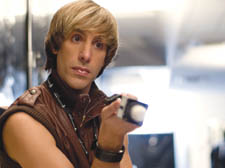|
|
 |
| |

Ali G star Sasha Baron Cohen relies on a tried and tested comedic style in his latest film, Bruno |
To be frank, Bruno’s
just a little passé
BRUNO
Directed by Larry Charles
Certificate 18
WE have an ingrained belief that our pop culture is hipper than anything produced by our Continental cousins and American siblings.
Think Swinging London and Cool Britannia: it has given us the right, apparently, to consistently lampoon Eurotrash and general Redneckery.
So you know what to expect from Sasha Baron Cohen as he launches a twin attack, as if we are safeguarded from such faux pas by our island state. Europe? Full of tacky gay people. America? They are all bigots.
Baron Cohen becomes Austrian TV host Bruno, a flamboyant gay man who wants to be world famous, but has no discernible talents. Still, armed with a stack of producers’ cash and a camera crew, Bruno finds it easy to get himself into potentially interesting situations such as visiting a priest who believes he can “cure” gay people, a wrestling contest as “anti-faggot fighter” Straight Dave, and a swingers’ orgy.
Baron Cohen has an eye for the awful and can give you cringe on tap.
It leads to some glittering moments, and great one-liners: on deciding he needs to take up a “cause”, he tells his assistant that “we’ve had Darfur... what’s Darfive?”
He tries to get Israelis and Palestinians together, which leads to a classic Ali G-style joke where he mistakes Hamas for a chickpea spread. But the skit becomes shadowy when he heads into a refugee camp and asks a group to kidnap him, a sure way to become famous, he believes.
While this is edgy, and as with every scene in this film you cannot help but admire Baron Cohen’s bravery, the real backdrop is so strong that it is hard to find yourself seeing the humour in this (although telling one of the Arabic enforcers he is interviewing that their king looks like a “dirty wizard or a homeless Santa Claus” was not just brave or foolhardy, but very funny indeed).
While these are silver linings, sadly Bruno relies heavily on toilet humour. The constant, weak jokes about gay sex are just not funny, and go on and on and on and on.
And this is one of Baron Cohen’s failings: he found a gag in Ali G which worked, even if Dennis Pennis had been tossing self-centred celebs dumb questions while Baron Cohen was just a stuck-up Hampstead private school pupil. Never mind, Baron Cohen used it brilliantly in Ali G, but then stretched the joke as far as he could with Borat. Was Borat actually funny? It became a matter for discussion, as the targets he set up to expose – petty anti-Semites, horrible homophobes – were essentially ignorant or dangerous, or both.
This film is just the same trick regurgitated.
Ali G and Borat had all these undertones of anti-gay rhetoric, and that’s the prime mover of Bruno.
The final scene shows what a star Baron Cohen has become. He brings Bono, Snoop Dogg, Elton John, Chris Martin, Slash and Sting together to appear on a song called Bruno the Dove of Peace. You can imagine the conversations held as these performers decided whether to say yes to Baron Cohen’s approach.
You can imagine the fawning flattery; these stars would have felt they were on the inside of this joke, as all are typical of the targets Bruno is sending up. It is Baron Cohen’s plan of attack.
Whether you find him an obnoxious comedian, or think his use of stereotypes helps expose the ridiculousness of bigotry, he knows what his audience wants to see and makes sure he provides it.
The essential problem of this film is that it falls between two stalls. Louis Theroux does a much better job exposing the oddities of ignorance in his deadpan approach, and it is not originally funny enough to hold its own otherwise.
There is also the danger that through his extravagant character Bruno could lead to enforcing stereotypes and encouraging homophobia rather than showing how stupid it is. |
 |
|
 |
| |
|
 |
|

